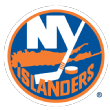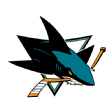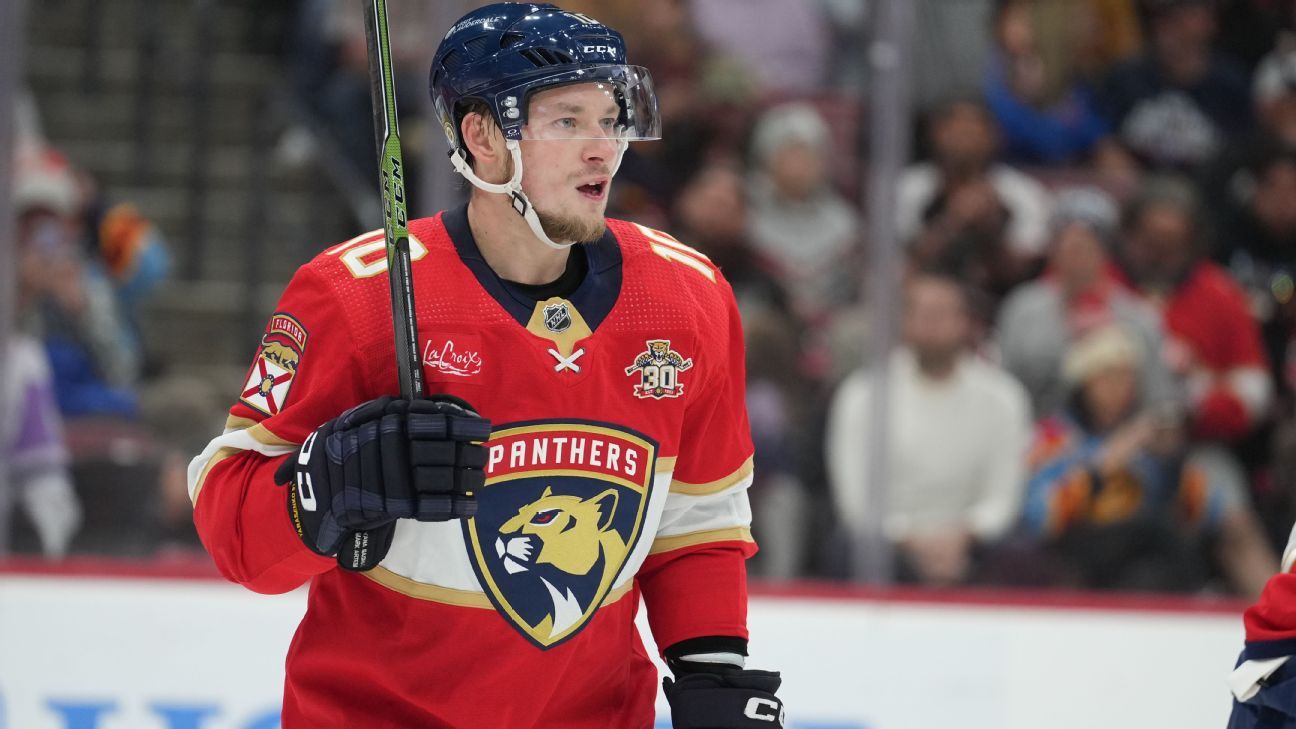The 2024 NHL trade deadline was Friday at 3 p.m., and the finish included a shocking deal: Tomas Hertl, the San Jose Sharks‘ All-Star representative, was moved to the Vegas Golden Knights, who had already acquired Noah Hanifin and Anthony Mantha.
But while the Knights’ moves generated a sizable amount of the attention, most of the league’s 32 teams took part in the festivities to some degree. And all of those trades will have an impact on the playoff races, as well as the “race” for the draft lottery standings, with Boston University freshman Macklin Celebrini the likely No. 1 pick this summer.
Which teams did the best in setting themselves up, in either direction, with their moves this trade season? Using the Elias Lindholm trade on Jan. 31 as our starting point, here are grades for all 32 GMs, along with our analysis on how those deals will impact the remainder of the 2023-24 season — and the Stanley Cup Playoffs.
Stats are collected from sites such as Natural Stat Trick, Hockey Reference and Evolving Hockey. Cap space figures are per Cap Friendly.
Note: Kristen Shilton provided the analysis for the Atlantic and Metropolitan teams, while Ryan S. Clark handled the Central and Pacific clubs.

ATLANTIC DIVISION

Grade: B-
Key additions: F Pat Maroon, D Andrew Peeke
Key subtractions: None
Impact on the rest of the season: Boston’s salary cap constraints foreshadowed a quieter deadline than last season (when they loaded up with the likes of Dmitry Orlov and Tyler Bertuzzi). And rumor has it one deal the Bruins tried to execute — goaltender Linus Ullmark to the Kings — didn’t pan out. What the return there could have been we may never know.
In terms of what did transpire, GM Don Sweeney went for some low-risk, high-reward additions in Maroon (provider of sandpaper and postseason experience once he gets healthy) and Peeke. Good enough.
Boston learned the hard way in 2023-24 that being the league’s top team going into the playoffs doesn’t guarantee a thing. The Bruins have an established core and overall good chemistry that won’t be disrupted by trying to work prominent pieces into the lineup prior to the postseason. Maybe this time that’ll be what gets them results when it counts. And while some would say an upgrade at center would have helped, it’s hard to argue with what they’ve done so far. If they didn’t significantly improve at the deadline, they haven’t hindered progress either.

Grade: B-
Key addition: D Bowen Byram
Key subtractions: F Casey Mittelstadt, F Kyle Okposo, D Erik Johnson
Impact on the rest of the season: This was a difficult deadline season for the Sabres. It nearly brought Buffalo GM Kevyn Adams to tears talking about trading 25-year-old Mittelstadt and two beloved locker room veterans, Okposo and Johnson.
But the reality is those moves had to be made. The Sabres’ season disintegrated faster than a Nature Valley granola bar, and all Adams could do once that realization set in was guard against more failure in Buffalo’s future.
Byram has strong potential — the Sabres were scouting him for a while — and he could be a solid piece on their burgeoning back end. That helps cushion the blow of seeing Mittelstadt — a pending RFA that Buffalo likely couldn’t satisfactorily re-sign long-term — traded to Colorado.
Adams didn’t make deals frivolously. Given the Sabres’ determined fate for this season the real test for Adams will be what he does in the offseason to ensure Buffalo finally emerges from its 12-year (and counting) postseason drought.

Grade: C
Key additions: None
Key subtractions: None
Impact on the rest of the season: It appears Detroit will do its talking on the ice, because there wasn’t much for GM Steve Yzerman to say about its recent (in)action. Other than executing a minor league move (Yzerman flipped Klim Kostin to San Jose for Radim Simek and immediately assigned him to the AHL), the Red Wings’ roster remains intact.
Notably, Detroit did make a crucial free agent signing already this season when Patrick Kane came on board in November. But Yzerman claimed Detroit was better off adding depth from its affiliate in Grand Rapids than parting with high draft picks for unknown commodities.
Is that fair? Maybe. The Red Wings have a palpable chemistry that’s been driving their increasingly strong play, and they are well positioned in the Eastern Conference playoff race. They’re flashy. They’re fun. And Yzerman stressed how pleased he is with the organization’s prospect pool.
Basically, the Red Wings are confident in what they have. Will the stand-pat strategy pay off? That’s the key. Other teams vying for playoff positioning did make additions (with one notable exception behind them). Ultimately, where the Red Wings end up will be determined by how well Yzerman quite literally read his room — and accurately assessed its potential to succeed.

Grade: A-
Key additions: F Kyle Okposo, F Vladimir Tarasenko, G Magnus Hellberg
Key subtractions: None
Impact on the rest of the season: Florida has soared to the top of the NHL standings. And now the Panthers have aced deadline season to boot. GM Bill Zito worked the phones to add Tarasenko and Okposo, two capable veterans bringing scoring prowess and steady leadership respectively.
Just as critically, Zito took care of the Panthers’ own by inking underrated defenseman Gustav Forsling to an eight-year extension, ensuring the one-time waiver-wire pickup turned integral piece of Florida’s back end won’t be going anywhere.
The Panthers have every reason to believe they can recreate last season’s playoff success with a run back to the Stanley Cup Final. Zito bolstered that notion with his strategic deadline dealings, targeting players desperate to jump in and help Florida win. It’s the perfect match. The Panthers defied expectations last season with a magical sprint to the finish line, but this year is different. The Panthers went from hunters to hunted, and they’ve been laying groundwork to ensure there are no sudden letdowns ahead.

Grade: B-
Key additions: None
Key subtractions: F Sean Monahan, G Jake Allen
Impact on the rest of the season: Montreal finally slayed that three-headed goalie dragon by moving Allen to New Jersey and leaving Sam Montembeault and Cayden Primeau to tag team the crease duties from here.
But GM Kent Hughes’ finer work was reeling in a first-round pick from Winnipeg in exchange for Monahan in a February transaction that could be easily forgotten by now, but helped set Montreal up to either draft another top prospect or flip the pick for more immediate assistance.
What the Canadiens did not accomplish before the deadline was finding new homes for Tanner Pearson — the only pending UFA in their midst — or forward Joel Armia. There was interest in both skaters, but Hughes didn’t feel compelled to make a move on anything he was offered. The Canadiens appear in no hurry to get out of their current rebuild, so Hughes can afford to wait until the offseason to continue tinkering.
The clock is ticking, though. Montreal has some excellent players in Nick Suzuki and Cole Caufield approaching their prime seasons. The Canadiens’ core deserves to have support around them in years to come — on a team that’s built to make a real push for the playoffs. Getting a high pick in the lottery will be nice, but how soon will that player be able to help?

Grade: C
Key additions: None
Key subtraction: F Vladimir Tarasenko
Impact on the rest of the season: Ottawa has been through enough change this season. GM Steve Staios didn’t prioritize more of it at the deadline.
What Staios did complete was parting ways with Tarasenko, a pending UFA who was unlikely to re-sign with the Senators. Staios has been patient and methodical in Ottawa since replacing Pierre Dorion in December. While the former GM was apt to make splashier moves (like, say, trading for Alex DeBrincat two years ago), Staios is still getting a feel for the Senators as they adjust to new ownership, a new coach and, of course, his own style.
That translated to Jakob Chychrun remaining with the club, and no surprise trade of blueliner Thomas Chabot (something the rumor mill cooked up over the last several days). Ottawa did claim Boris Katchouk off waivers from Chicago, and that could turn into a nice addition. Right now the Senators need more than just nice, though. There’s a long offseason awaiting for Staios & Co. to get Ottawa back on the rails for next season, and capitalize on the talent they have available.

Grade: B
Key additions: F Anthony Duclair, D Matt Dumba
Key subtractions: None
Impact on the rest of the season: Tampa Bay is always doing something at the deadline. This year, the Lightning boosted their depth up front with Duclair, and put faith in Dumba to be a useful addition on the back end.
Duclair could be especially helpful given Tampa Bay’s scoring inconsistencies this season. He’s a capable top-six winger who will bring speed and strength to an aging Lightning forward group, and that’s a shot in the arm the team needs as it fights to hold on to an Eastern Conference wild-card spot.
Speaking of wild cards, there’s Dumba. He’s had a difficult season so far in Arizona, but playing for a potential contender often brings out the best in players hungry to experience postseason success. The Lightning lost Mikhail Sergachev to a broken leg, and their blue line play has suffered accordingly. Dumba has a good opportunity here — now he must deliver. The 2027 fifth-round pick Tampa Bay gave up for him hardly broke the bank.

Grade: B-
Key additions: F Connor Dewar, D Joel Edmundson, D Ilya Lyubushkin
Key subtractions: None
Impact on the rest of the season: Toronto did the minimum necessary to improve, and maybe that’s enough. The Leafs needed blue-line depth in the worst way, and found it in Edmundson and Lyubushkin. Both skaters are physical pests and that’s a contrasting element the Leafs have been lacking in their defensive group. What’s also been absent is a balance of left- and right-shot defensemen, and GM Brad Treliving barely addressed that by only getting one additional righty in Lyubushkin.
Still, if Edmundson and Lyubushkin can make Toronto less one-dimensional and remove some pressure from the younger defensemen to perform, then the low-risk transactions can pay off.
Dewar should also bring a little snarl to the Leafs’ fourth line as an aggressive player who’s not afraid to use his body to win battles. Toronto is hardly starved for finesse up front. Insufficient depth has hindered the Leafs, and Treliving showed what the team is prioritizing there by bringing in players who deviate slightly from Toronto’s typical mold. If nothing else, it’s a fresher strategy. And as always, the Leafs will be judged solely on what it does to help — or hurt — their success in the postseason.

METRO DIVISION

Grade: A
Key additions: F Jake Guentzel, F Evgeny Kuznetsov
Key subtraction: F Michael Bunting
Impact on the rest of the season: Carolina is not messing around. Being swept in last season’s Eastern Conference finals clearly stung the Hurricanes, who managed just six goals in those four games against Florida.
Well, consider the lesson learned by Carolina, because the Hurricanes loaded up offensively to ensure they are less likely to be derailed by another scoring drought.
Guentzel is a top-line winger who has come of age playing alongside Sidney Crosby and has two 40-goal seasons under his belt. Kuznetsov will add excellent depth as a complementary piece in the Hurricanes’ forward group. And Carolina got to move on from Bunting, a pernicious player who never gained traction with the Canes.
It’s felt for years like Carolina was on the cusp of reaching another Stanley Cup Final and yet the defensive-minded squad consistently has fallen short of that expectation. Could this be the year they don’t? GM Don Waddell has gone above and beyond to add some goal-scoring prowess in order to prevent history repeating itself.

Grade: B-
Key addition: F Alex Nylander
Key subtractions: F Jack Roslovic, D Andrew Peeke
Impact on the rest of the season: Columbus was entirely practical leading up the deadline. The Blue Jackets handled their necessary business without overtly hurting their odds in the upcoming draft lottery.
It’s been a season of change in Columbus already, with GM Jarmo Kekalainen being fired and the Blue Jackets adjusting to a new regime. Team president John Davidson’s priority was making the right decisions for Columbus’ future. Shipping an underwhelming Roslovic to the New York Rangers and inconsistent defender Peeke to Boston were moves that can benefit the Blue Jackets long term, and give those skaters new opportunities elsewhere.
But Davidson also provided Columbus with a small spark in last month’s trade for Nylander. The winger had been struggling in Buffalo, but has thrived with the Blue Jackets, producing five goals and seven points in his first seven games. Nylander is a feel-good story and solid asset for Columbus to keep in the fold, via a move that doesn’t impact its ultimate strategy of obtaining the highest draft placement possible at this stage.
It’s been a brutal couple of years in Columbus. Landing high in the lottery would be a well-earned reward.

Grade: B
Key additions: G Jake Allen, G Kaapo Kahkonen
Key subtractions: F Tyler Toffoli, D Colin Miller, G Vitek Vanecek
Impact on the rest of the season: New Jersey looked closer to deadline losers right up to the final hour. That’s when the Devils unloaded underwhelming goaltender Vanecek — and his $3.4 million cap hit through next season — on San Jose in exchange for goalie Kahkonen (a pending UFA). Why the Sharks felt compelled to help New Jersey out on that one is a head scratcher. Regardless, it was good business by the Devils.
So too was grabbing Allen from Montreal to stabilize the goaltending position that’s been hurting them all season. The problem is that New Jersey waited until now to address its netminding, when Allen could have been acquired weeks (if not months) ago, and possibly given the Devils a better chance of making the playoffs.
Perhaps the Allen-Kahkonen tandem will ignite something for New Jersey. Maybe the Devils will respond better under new coach Travis Green, who took over this month from the fired Lindy Ruff. More likely though it’s too little, too late for the Devils to crawl their way back into the postseason fight. Case in point: GM Tom Fitzgerald trading Tyler Toffoli to Winnipeg for a meager return (two picks, with 50% salary retained). Toffoli is a pending UFA but was having a great season in New Jersey and could have continued that down the stretch.
The Devils could be beyond help now, sitting six points out of a wild-card slot. New Jersey should have been desperate for change sooner.

Grade: D
Key additions: None
Key subtractions: None
Impact on the rest of the season: New York gets a D here for basically not participating in trade-related activity whatsoever.
The Islanders’ only real move since the calendar flipped to 2024 was hiring Patrick Roy to replace Lane Lambert behind the bench. That’s been a moderately successful shift thus far. Otherwise, New York has remained the same since getting Mike Reilly off waivers in November, and adding Robert Bortuzzo from St. Louis in December.
GM Lou Lamoriello has said in the past that acquiring players around the deadline is how management rewards a team. This season, Lamoriello claims he didn’t feel the Islanders could be upgraded. That’s a fine compliment for New York, as they jockey for a wild-card playoff spot — a battle that’s likely to last until the end of the regular season.
Lamoriello handed out extensions internally over the summer and inserted Roy to give the Islanders some juice. It’s on the players themselves now to prove Lamoriello right in believing they’ve got what it takes to win.

Grade: B+
Key additions: F Jack Roslovic, F Alex Wennberg, D Chad Ruhwedel
Key subtractions: None
Impact on the rest of the season: The Rangers prioritized flashy acquisitions a year ago and all it got them was a first-round playoff exit. This season, GM Chris Drury was more prudent in his dealings, mirroring a well-used strategy from 2022 that helped New York earn an Eastern Conference finals berth.
New York had to stack the deck up front (particularly with Filip Chytil missing the rest of the season) and addressed that area with capable top-nine skaters in Wennberg and Roslovic. The Rangers backed up their blue-line depth too in adding Ruhwedel.
Drury emphasized the importance of New York filling specific spots within the Rangers lineup and it looks — on paper — like he was able to tackle the club’s greatest needs.
Of course, it’s easier to be pragmatic at this point in the season when New York has been so consistently strong. The Rangers have mostly thrived under first-year coach Peter Laviolette and sit atop the Metropolitan standings with a month to go until the playoffs. That had to give Drury confidence to mostly stay the course and simply try to improve around the edges.

Grade: B+
Key additions: F Denis Gurianov, F Ryan Johansen, D Erik Johnson
Key subtraction: D Sean Walker
Impact on the rest of the season: Philadelphia was something of a question mark heading toward trade season. Would GM Danny Briere go into full-on subtraction mode, despite the Flyers’ surprising turn as a legitimate playoff candidate? Or would he add to the mix and bolster Philly’s chances for a postseason berth?
In the end, Briere did a bit of both.
He sent Walker — one of the club’s most consistent defensemen — to Colorado and took on flailing forward Johansen, whom Briere intended to trade again before the deadline without success (Johansen was immediately placed on waivers).
But that’s all the significant subtracting Briere decided to do. He held on to veterans Nick Seeler (while extending the defender on a four-year deal) and Scott Laughton, plus Briere acquired Erik Johnson for the back end. Briere also brought in speedy Denis Gurianov for some short-term depth and removed Wade Allison — who never caught on with the organization — from the books.
It’s not activity we’d typically see from a rebuilding team. And nothing Briere did over the last few weeks will help the supposedly rebuilding Flyers’ draft position. Then again, Philadelphia hasn’t looked like a lottery team this season. Briere had to be enthused by that, and continued giving the young Flyers a chance to gain valuable playoff experience sooner than later.

Grade: C-
Key addition: F Michael Bunting
Key subtractions: F Jake Guentzel, D Chad Ruhwedel, G Magnus Hellberg
Impact on the rest of the season: If we were grading the Penguins on potential future success, they’d be earning a higher grade. As it is, GM Kyle Dubas did little to help his team in the short term by moving an impact forward like Guentzel and essentially replacing him with Bunting (who has had a mediocre season, at best, in Carolina).
Dubas did stock the Penguins’ relatively bare prospect cupboards with Ville Koivunen, Vasily Ponomarev and Cruz Lucius, which is not nothing. But having Sidney Crosby saying goodbye to his favorite winger as Pittsburgh stares down the barrel of a second straight season outside the playoffs — with morale decreasing accordingly? Not great.
The offseason looms large for the Penguins as Dubas navigates the franchise’s next direction. It certainly feels like they’ve arrived at a critical crossroads and every decision from here will have a significant impact on reshaping Pittsburgh for the several seasons. Of note: The Penguins’ first-round pick this summer belongs to San Jose (via the Erik Karlsson trade), unless it lands in the top 10.

Grade: C+
Key additions: None
Key subtractions: F Evgeny Kuznetsov, F Anthony Mantha, D Joel Edmundson
Impact on the rest of the season: What are the Washington Capitals exactly? Are they a team striving still toward playoffs? Are they focused on building for the future? Do we even know? Because post-deadline, it’s murky.
Washington is in the race for a wild-card spot, but GM Brian MacLellan traded Kuznetsov (who was in the AHL already), Mantha and Edmundson to weaken the group overall. On the other hand, MacLellan did not move coveted players like Nic Dowd and Max Pacioretty.
The goal apparently was to keep Washington mostly intact. That wasn’t MacLellan’s strategy a year ago when he became a bona fide deadline subtractor. The Capitals’ playoff hopes were lower then than they are now, yet it feels like there were missed opportunities by Washington, too.
Granted, the Capitals have an eye-popping amount of draft selections (26 picks over the next three seasons). And MacLellan also signed Rasmus Sandin to a long-term extension, securing a key piece of Washington’s future on the blue line. It just feels unfinished somehow, like the Capitals are in limbo.

CENTRAL DIVISION

Grade: C-
Key additions: None
Key subtractions: D Matt Dumba, D Troy Stecher, F Jason Zucker
Impact on the rest of the season: Adding Dumba, Stecher and Zucker this past offseason was part of a plan that could have gone one of two ways. Either the Coyotes had them for a potential playoff run, or they could be traded for draft capital if the playoffs were out of reach.
The latter outcome is what happened, and that’s why the focus is on the future. But there are questions about whether the Coyotes received enough in return by landing a 2024 sixth-rounder for Zucker and a 2027 fifth-rounder for Dumba when other teams were able to get more for players in similar roles.
The Coyotes are 20 points ahead of the Blackhawks in the standings, so it’s unlikely they’ll finish with the No. 1 odds in the draft lottery. But they are in play for a top 10 pick, which would be their fourth consecutive first-round pick in that range. Whoever they draft there, along with the rest of the 13 picks they own this summer, is expected to add to a young foundation led by Clayton Keller, Logan Cooley and Matias Maccelli, among others.

Grade: C-
Key additions: None
Key subtraction: F Anthony Beauvillier
Impact on the rest of the season: While they had additional pending UFAs that could have been moved, there was always a thought that the Blackhawks would not be much of a player at the deadline.
But the fact they couldn’t get involved as a third-party broker to attain extra draft capital is a bit puzzling for a team in a rebuild. Granted, they have seven picks in the first three rounds of this year’s draft, with five coming in the first two rounds.
Overall, the mission for the Blackhawks is winning the draft lottery for a second consecutive season, with the premise they could pair Connor Bedard with this year’s presumed No. 1 pick in Boston University center Macklin Celebrini, adding to an already bright future. So in that regard, we suppose it was mission accomplished.

Grade: A+
Key additions: F Brandon Duhaime, F Casey Mittelstadt, F Yakov Trenin, D Sean Walker
Key subtractions: D Bowen Byram, F Ryan Johansen, F Ben Meyers
Impact on the rest of the season: Any questions that may have existed about the Avs’ roster were emphatically answered at the deadline.
They traded for a second-line center who could help them now and in the future in Mittelstadt, a pending RFA. They landed Walker, who will serve in a bottom-pairing role but could move to the second pairing. They were also able to add around the edge and build depth with Duhaime and Trenin.
Everything they did at the deadline is with the singular mission of trying to win a Stanley Cup in the gauntlet that is the Western Conference.

Grade: B+
Key addition: D Chris Tanev
Key subtractions: None
Impact on the rest of the season: The Stars didn’t do that much because they really didn’t need to add for the sake of adding.
They did, however, need a right-handed top-pairing partner for Miro Heiskanen. Trading for Tanev checked that box, while also making the Stars stronger on the back end. Getting Tanev meant they didn’t have to part with a first-round pick, which have been crucial as the Stars turned themselves into a legitimate Stanley Cup contender over the last few years.
Now the goal for the Stars is to at least return to the Western Conference Final for the second consecutive season with the plan of taking it one round further.

Grade: C+
Key additions: None
Key subtractions: F Connor Dewar, F Brandon Duhaime, F Pat Maroon
Impact on the rest of the season: Too many points for a lottery pick, and enough points to remain somewhat involved in the wild-card race. This is the middle ground the Wild were caught in leading up to the deadline, and it will be that way for the rest of the season.
It’s the sort of separation from either end of the spectrum that forced the Wild to face the reality of moving on from players in order to gain more draft capital that could help them in the future. So in that regard, GM Bill Guerin and his staff did fine here. And with a bit of a heater here after Sunday’s win over Nashville, maybe they make some noise in the wild-card race after all.

Grade: B-
Key addition: F Jason Zucker
Key subtraction: F Yakov Trenin
Impact on the rest of the season: The Predators’ approach to the deadline was a bit complex.
They found a way to add draft capital by trading Trenin, while adding Zucker in an effort to remain in a competitive wild-card race.
But they couldn’t strike a deal for pending UFA defensemen Tyson Barrie or Alexandre Carrier in a market where there was a need for right-handed shooters. It’s especially surprising in the case of Barrie, who would have presented teams with a veteran puck-mover who has extensive experience running a power play. Instead, he’ll retain his spot as the Preds’ seventh defenseman, as he has not meshed well with Andrew Brunette’s system.

Grade: D
Key additions: None
Key subtractions: None
Impact on the rest of the season: The Blues were always going to be in a difficult position at the deadline. They have too many points to contend for a lottery spot, while being within six points of the final wild-card spot. As of Friday, they had 19 games left, but that might not be enough runway to make the playoffs in the competitive West.
Those circumstances provide the context for why the Blues were silent. Many expected they would trade Pavel Buchnevich, who has a year left on his contract. Meanwhile, Blues GM Doug Armstrong told reporters the club would speak with Buchnevich’s representatives in the summer about an extension. There was also some external thought that they’d deal Kevin Hayes (whose salary was already 50% retained by the Flyers).
Even with the back-and-forth about Buchnevich and Hayes, the Blues didn’t add any draft capital as a third-party broker either, despite having all their retained salary slots to use. A missed opportunity. And yeah, the Blues will be what they’ve been, stuck in between making a real run or sinking to the bottom.

Grade: A
Key additions: F Sean Monahan, D Colin Miller, F Tyler Toffoli
Key subtractions: None
Impact on the rest of the season: Only two Western Conference teams came out of the deadline with less than 200 goals on the season. The Jets were one of them.
They’ve remained in the hunt to win the No. 1 seed in the playoffs due to their goal suppression, and the premise here was that adding more offensive options would help.
Acquiring Monahan at the All-Star break allowed them to get an early start, while trading for Toffoli on deadline day allowed them to strengthen their lineup. They will be a serious player in the Western Conference race down the stretch.

PACIFIC DIVISION

Grade: B+
Key addition: F Ben Meyers
Key subtractions: F Sam Carrick, F Adam Henrique, D Ilya Lyubushkin
Impact on the rest of the season: The first-round pick the Ducks received from the Oilers as part of the Carrick and Henrique deal was the centerpiece of what was slated to be a busy deadline for the Ducks. They ended up coming away with three picks and traded one of them to get Meyers. Losing the veterans off their roster allows younger players to get a chance to play, while also (likely) increasing their draft lottery position.
The Ducks have two first-round picks in a draft that should see them get a fifth straight top-10 pick, and a second top-three pick in two years. However, winning the lottery would not only give them the chance to take the presumed No. 1 pick in Boston University center Macklin Celebrini; it would be the first time in their 30-year history the Ducks have ever won the draft lottery.

Grade: B-
Key addition: F Andrei Kuzmenko
Key subtractions: D Noah Hanifin, F Elias Lindholm, D Chris Tanev
Impact on the rest of the season: The Flames were able to get two first-round picks and a total of six draft picks that should aid in what appears to at least be a retool (if not a rebuild).
The Flames now have five picks apiece in the first three rounds in each of the next three drafts. Still, the fact they couldn’t land a first for Tanev raised questions about why that didn’t materialize, when he had been considered to be the No. 2 defenseman ahead of the deadline (behind teammate Hanifin).
The immediate question facing the Flames now is if they can thread the needle of having subtracted those key players while also making a push for the final wild-card spot. They had 20 games left after Friday’s deadline, trailing the Golden Knights by six points.

Grade: B
Key additions: F Sam Carrick, F Adam Henrique, D Troy Stecher
Key subtractions: None
Impact on the rest of the season: Adding Carrick and Henrique allowed the Oilers to address their bottom six, with the idea that Henrique provides potential top-nine, if not, top-six flexibility if needed.
With Stecher giving them depth on the back end, the Oilers were able to add in a number of key areas. Questions have been raised, however, if they could have done more to get another defenseman.
There was also the concern about whether they needed to get a more experienced backup goaltender beyond Calvin Pickard in the event something happens with Stuart Skinner. Even with those potential concerns, the Oilers kept pace by adding to their roster — much like their counterparts in the race to win the Western Conference.

Grade: D
Key additions: None
Key subtractions: None
Impact on the rest of the season: Seven of the eight teams that ended deadline day in a Western Conference playoff spot made one or more moves. The Kings were the outlier.
Daily Faceoff reported they had a trade in the works for Boston Bruins goaltender Linus Ullmark, but it fell apart. However, the fact they have two top-six wingers on LTIR — and $4.461 million in deadline cap space, and had all their first-round picks — and added no one? Puzzling.
This is a team fighting for its playoff life, with a clear need for some help in goal creation and suppression, particularly as they wait for Viktor Arvidsson and Carl Grundstrom to return from LTIR. Even a depth addition in exchange for a 2025 or 2026 pick would have been wise.
It’s not entirely necessary to make big-ticket additions at the deadline, which the Florida Panthers showed last year in advancing to the Cup Final. It’s possible that the Kings could do the same; they won six of their last 10 games entering deadline day. But all eyes are going to be on the Kings to see if they can get out of the first round for the first time in a decade, and it appears to many observers that some upgrades could have been made.

Grade: C-
Key additions: F Klim Kostin, G Vitek Vanecek
Key subtractions: F Anthony Duclair, F Tomas Hertl, G Kaapo Kahkonen
Impact on the rest of the season: The Sharks might have had the most bizarre deadline of any team.
-
They received a first-round pick and a prospect for Tomas Hertl — but parted with two third-rounders (and retained salary) to make it happen.
-
They swapped goaltenders with the Devils, but took on a struggling player with an onerous contract that extends beyond this season, trading away a pending free agent.
-
They traded proven scorer Anthony Duclair in a deal that overwhelmed some evaluators.
Overall, they came out of trade season with one fewer draft pick than they had going into the deadline. No really. The Sharks were involved in six deals, acquiring four draft picks while trading away five.
In terms of what it means going forward, they still have two first-round picks in each of the next two draft cycles. And they’re neck-and-neck with the Blackhawks to have the strongest odds of winning the lottery and drafting Celebrini. But is this a team that should be emerging with a net loss of draft picks at this point — with years to go before they’re competitive again?

Grade: C+
Key additions: None
Key subtraction: F Alex Wennberg
Impact on the rest of the season: Re-signing alternate captain Jordan Eberle to a two-year contract was the biggest move for the Kraken on deadline day. He was rumored to be available in trade, but the new deal put an end to all of that. Beyond that, they were able to get two draft picks in a trade that saw Wennberg head to the Rangers.
Initially entering the deadline with five players who were slated to be pending UFAs led many to think the Kraken would be in line to attain quite a bit of draft capital.
Holding on to the majority of those players has set the stage for the Kraken to attempt to land a wild-card playoff spot for the second consecutive season.

Grade: B+
Key addition: F Elias Lindholm
Key subtraction: F Andrei Kuzmenko
Impact on the rest of the season: Adding Lindholm at the All-Star Break was a signal that the Canucks were serious about going all-in for a Stanley Cup. Cap Friendly projected they would have a little more than $1 million in deadline cap space to add around the edges. Trading for Lindholm ultimately became the Canucks’ only move of trade season, though they did also add towering defenseman Nikita Zadorov back in November.
Watching other teams in the West add more than one player to their team created questions about whether the Canucks had done enough to keep pace. But that also comes with the context that the Canucks used the last several months to gradually retool their defense, while keeping an eye on the future by signing star center Elias Pettersson to an eight-year deal that starts next season. And to be fair, this is a team that remains in first place in the West, and 12 points ahead of the Oilers for the division title.

Grade: A++
Key additions: D Noah Hanifin, F Tomas Hertl, F Anthony Mantha
Key subtractions: None
Impact on the rest of the season: Winning a Stanley Cup has been the expectation in Vegas since the club’s first season. Now that they’ve won one, the expectation is to go win another by any means necessary, and orchestrating the most aggressively advantageous deadline in the NHL is a step in that direction.
The Golden Knights were able to finesse the finer points in three separate deals that allowed them to manage all their draft capital and cap space in order to pull off the trifecta: A top-six forward in Hertl, a top-nine forward in Mantha and a top-pairing defenseman in Hanifin.
Hertl is under contract for six more seasons (with the Sharks picking up 17% of the freight, no less), while the Golden Knights have shown interest in getting an extension done for Hanifin, a pending UFA. Their actions at the deadline put them in position to win again this year — with the belief they can continue to be in that position for years to come.


